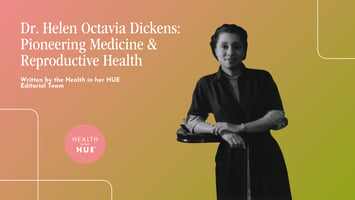For Dr. Helen Octavia Dickens, medicine was more than a profession—it was a mission. At a time when...
Dr. Matilda Evans
 In a time when Black women and children had little to no access to quality medical care, Dr. Matilda Evans created a path forward. She wasn’t just the first Black woman licensed to practice medicine in South Carolina—she was a force of change, a fierce advocate for public health, and a community leader who dedicated her life to making sure Black families received the care they deserved.
In a time when Black women and children had little to no access to quality medical care, Dr. Matilda Evans created a path forward. She wasn’t just the first Black woman licensed to practice medicine in South Carolina—she was a force of change, a fierce advocate for public health, and a community leader who dedicated her life to making sure Black families received the care they deserved.
Dr. Evans understood something that still holds true today: healthcare isn’t a privilege, it’s a right. And she spent her entire career proving that, one patient at a time.
A Determined Path to Medicine
Born in 1872 in Aiken, South Carolina, Matilda Evans grew up in the post-Reconstruction South, where racial barriers made it nearly impossible for Black people—especially Black women—to enter the medical field. But that didn’t stop her.
She pursued her education with unwavering determination, eventually earning her medical degree from the Woman’s Medical College of Pennsylvania in 1897. At the time, very few Black women were admitted to medical schools, making her accomplishment groundbreaking.
Armed with her degree and a passion for community care, she returned to South Carolina, becoming the first Black woman licensed to practice medicine in the state.
Building Healthcare Access from the Ground Up
As soon as Dr. Evans started practicing medicine, she recognized a devastating reality: Black women and children had almost no access to proper medical care. Hospitals in the Jim Crow South refused to treat Black patients, and poverty made it impossible for many to afford a doctor.
So, she created the care they needed.
Dr. Evans opened her own practice, where she provided maternal and pediatric care for Black women and children, often free of charge. She saw her role as more than just a doctor—she was a community caregiver, an educator, and an advocate.
She didn’t stop at one clinic. Recognizing that thousands of Black families in South Carolina had no healthcare at all, she opened multiple free clinics and even founded a hospital to ensure Black patients had a place to go for treatment.
A Vision for Public Health
Dr. Evans didn’t just treat individual patients—she worked to change the entire system. She knew that real change required education and policy reform.
She launched public health initiatives aimed at:
✅ Providing vaccinations to prevent common childhood diseases.
✅ Advocating for school health programs so Black children had access to medical check-ups.
✅ Educating Black families on hygiene, nutrition, and disease prevention.
She even started a community nurse training program to ensure that more Black women had access to medical education and could continue the work she started.
Her vision was bold: she believed that public health should include everyone, regardless of race or income.
Breaking Barriers for Black Women in Medicine
At a time when few Black women could even dream of becoming doctors, Dr. Evans mentored young Black women who wanted to enter the medical field. She knew that representation mattered—that Black women needed to see themselves in medicine, not just as patients, but as healers.
Her legacy helped pave the way for future Black women physicians, nurses, and public health leaders who continue to fight for maternal and child health equity.
Dr. Evans’ Legacy in Today’s Fight for Reproductive Justice
More than a century later, Black women still face racial disparities in maternal and child healthcare. The Black maternal mortality rate remains shockingly high, and Black families continue to struggle with limited access to quality care.
Dr. Evans’ work reminds us that the fight for equitable healthcare is far from over. But it also shows us that change is possible when we invest in our communities and demand better.
Want to learn more about the Black women shaping reproductive health today?
📖 Read: Honoring Black Women’s Impact on Reproductive Health & the Future
💜 Join the Health In Her HUE Community! Find culturally competent doctors, share your experiences, and connect with other Black women advocating for our health.


